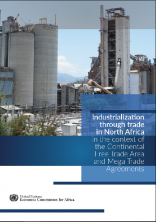Industrialization through trade in North Africa in the context of the Continental Free Trade Area and Mega Trade Agreements

Structural transformation in North African countries requires the significant development of North Africa’s industrial sector in an adverse global context which restricts the emergence of newly industrialized countries. To face this challenge, North African countries must design and implement coherent and proactive industrial policies that would be aligned with national development plans in order to capitalize on the region’s synergies.
In this context, the creation of the African Continental Free Trade Area (AfCFTA) by 2017 is a vital opportunity to promote regional integration, the facilitation of intra-African trade and industrial development across Africa. North Africa is part of this process and stands to benefit from it. The static and dynamic effects that CFTA is expected to produce should promote the development of trade, economies of scale through increased market size, stronger competition and competitiveness.
This document is the final result of an experts meeting held in Rabat, Morocco, on 1-2 March 2016. Public policymakers, researchers and private sector actors will find here a prospective analysis of the expected benefits of the free trade agreement for North African countries as well as suggested tools and channels that could enable the region to turn the area into a stepping stone toward industrial development and the structural transformation of North African economies.
Using a computable general equilibrium model type, this publication considers the effects of setting a continental free trade area on North African economies, it’s positive impact on industrial development as well as a quantitative estimate of the expected effects of the Greater Arab Free Trade Area (GAFTA), the Euro-Mediterranean partnership (Euromed) project and trade facilitation measures.